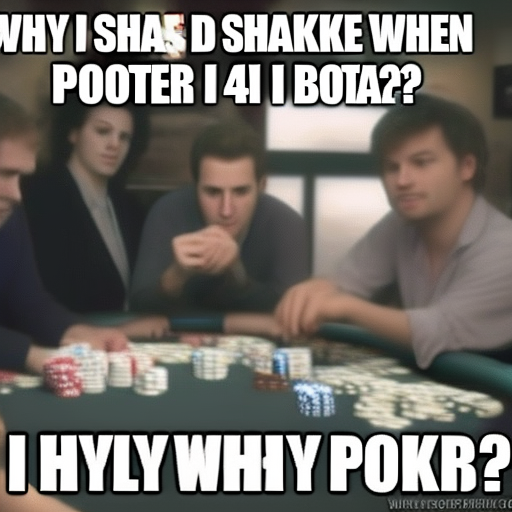Are you ready to take the gamble? If you are, then you must be ready for the thrill and that means your body is ready for the ride. Have you ever found yourself trembling when you play poker? Well, don’t panic as there is a reason why players shake when they are engrossed in a poker game. In this article, we will explain why some players experience trembling when they play this game.
Psychological Reasons
Many players experience shaking or trembling while playing poker, and it’s not just a physical issue. There are several behind this phenomenon. One common cause is anxiety. When you’re playing for high stakes, it’s natural to feel anxious, especially if you’re new to the game or playing against more experienced players. This anxiety can manifest itself in the form of shaking or trembling.
Another psychological factor that can contribute to shaking during poker is pressure. If you’re playing in a tournament or in a game where there are others watching you or relying on you, the pressure can be intense. This can lead to feelings of stress, which can then lead to shaking or trembling. Even professional players are not immune to this. Just take the example of Antonio Esfandiari, who famously lost a bet that required him to lunge everywhere instead of walking normally. He developed what is known as ‘the poker limp,’ which was a manifestation of the intense psychological pressure that he was under when playing the game.
So, for those who shake when playing poker, know that you’re not alone. Anxiety and pressure are just two of the many psychological factors that come into play during a game. Understanding why you’re shaking is the first step to controlling it. One way to address this is to practice mindfulness techniques before and during the game to help manage stress and anxiety. It may also be helpful to take breaks during the game to calm your nerves and relax your muscles. Finally, don’t forget that playing poker is supposed to be enjoyable, so don’t get too caught up in the moment!
Physiological Implications
:
When you sit down to play poker, your body goes into a fight or flight mode. The adrenaline starts pumping, your heart beats faster, and your palms become sweaty. The reason for this is a biological response called the stress response. It’s your body’s way of preparing for danger or a perceived threat.
As a poker player, you know there’s no actual danger, but your body doesn’t. As a result, you may start to feel shaky or jittery. This is because your body is trying to release the adrenaline to prepare you for action. As a poker player, it can be difficult to control this response. However, there are a few things you can do to help yourself. Start by taking deep breaths and trying to calm your mind. Remember, you’re not in any immediate danger. Try to focus on your game instead of your body’s reaction.
- Try some relaxation techniques like yoga or meditation to help train your body to relax in stressful situations.
- Get enough sleep and exercise to keep your body healthy and reduce overall stress levels.
- Avoid caffeine and other stimulants before playing poker as they can exacerbate feelings of anxiety and shakiness.
It’s important to remember that these physiological responses are normal, and most players experience them to some degree. By understanding the biological reasons behind why you’re shaking, you can start to take steps to control your body’s response and play a better game.
Strategies to Combat Shaking
Strategies to Keep Your Cool at the Poker Table
Playing poker can be nerve-wracking, and the adrenaline rush can cause your hands to shake. Don’t let this affect your game – here are some strategies to keep your cool at the poker table:
- Breathe Deeply: Taking deep breaths can help calm your nerves and keep your heart rate steady. Focus on your breath and try to slow it down. Inhale through your nose and exhale through your mouth.
- Practice Measured Movements: Keep your movements slow and deliberate. Control your actions instead of rushing through them. Take a deep breath before you make your move, and calmly execute your play.
- Visualize Success: Picture yourself making the right call or making a big win. This can help relieve your anxiety and give you the confidence to make decisive moves.
Remember, shaking hands may give away your nervousness to other players, and some may use that to their advantage. By incorporating these strategies and staying calm, you can keep your game face on and take control of the hand. Good luck at the tables! Poker can be a thrilling game, but it can also be intimidating–especially when your body starts shaking. Though shaking could be a sign of a fear of losing, the good news is that with a few simple strategies, you can stop the trembling and start playing with the confidence and poise of a poker champion. Good luck at the table–now you have the tools you need to not just face your fears, but beat them.